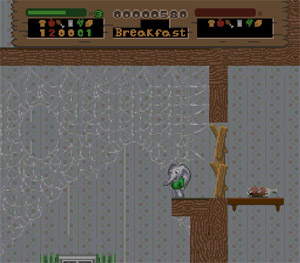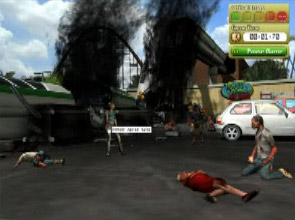Can Video Games Be Used in Health Care? (VG Series Part 5/10)
Neo-Academic coverage of the Journal of General Psychology special issue on the psychology of video games:
- Is Video Game Research Influenced by the Media?
- Does Personality Predict Vulnerability to Violence in Games?
- Can Spatial Cognition Be Trained with Video Games?
- How Do We Design Effective Video Games for Learning?
- Can Video Games Be Used in Health Care?
- Should Children with Autism Play Video Games?
- Should Video Games Be Used in Therapy?
- Can Video Games Get People to Vote?
- How Do Video Games Motivate People?
- How Do Typical Gamers Play Games?
![]() There are few topics so hotly debated on the Internet as the value of video games. Are they the next generation’s artistic advance, as film was for the last, or are they a blight that makes children overly aggressive and dangerous? In this 10-part series, I’m reviewing a recent special issue of the Journal of General Psychology on video games. For more background information, see the first post in the series.
There are few topics so hotly debated on the Internet as the value of video games. Are they the next generation’s artistic advance, as film was for the last, or are they a blight that makes children overly aggressive and dangerous? In this 10-part series, I’m reviewing a recent special issue of the Journal of General Psychology on video games. For more background information, see the first post in the series.
In the fifth article in this issue, Kato (2010)1 discusses the potential uses of video games in health care. There are two broad perspectives discussed: 1) the use of video games for improving patient care (training medical personnel, especially for surgical training) and 2) the use of video games for improving patient compliance (training patients).
After lamenting the brevity of the video games literature in comparison to the patient care literature, Kato reveals the primary advantages to patient care are 1) patients playing video games to learn about their conditions/treatment is usually voluntary, 2) they are intrinsically motivating (I read this to mean “they are more fun than sorting through 50 pages of text”), 3) they often involve active play, and 4) it is unique in patient care in that it involves some degree of fantasy (though Kato uses the somewhat disparaging term, “make-believe quality.”) Kato also makes a totally unnecessary invocation of Freud to help explain this.
Kato also gives an interesting perspective on games in general, which I find myself agreeing with:
If we thought about video games as play for adults, we could create a research program that examined the relationship between
video game play and social skills such as perspective taking and empathy; psychosocial functioning such as self-confidence, happiness, relaxation, and achievement motivation; and cognitive skills such as attention, planning, spatial reasoning, and creativity. Researchers who develop and evaluate the impact of serious games should acknowledge theories of play as a pathway to learning, not just among children, but among adults as well.
This is certainly one of the biggest weaknesses in the current (small) research literature in psychology. Much gaming research de-emphasizes play (i.e. fun), which takes away much of its value – entertainment as a way to increase motivation to learn. Edutainment lacking play is not edutainment – it’s just education, and should be treated as such.
Kato continues by describing several interesting applications of video games in health care studied already. Note that I use the word “developed” to indicate that the study was developed by researchers (in contrast to commercially available games):
- Video games have a positive effect on side effects associated with cancer treatment, including nausea, vomiting, anxiety, and pain associated with chemo (which started with research on the Atari 800 XL!).
- Video games decreased anxiety of children about to receive general anesthesia – as effectively as medication.
- Video games can be used in physical therapy to restore hand-eye coordination and muscle control (and are much more interesting than traditional physical therapy). One study even used wheelchair maneuvers to race in Need for Speed II and Power Boat Racer!
- A video game called SnowWorld was developed and used successfully to reduce self-reported pain in people with chronic pain from burns.
A video game called Packy and Marlon was developed and used successfully to teach children how to manage their insulin levels.
- Video games called Brokie the Brontosaurus and SpiroGame were developed and used successfully to teach children about asthma and control their breathing.
- Several video games have been developed to better help children deal with voiding dysfunction (urinating or defecating when not otherwise desired, often triggered by irritable bowel syndrome).
- A video game called Re-Mission was developed and used successfully to increase cancer treatment compliance in adolescents (taking their proscribed medications correctly).
- A number of studies have linked surgical skill with video game use, and though most of this research is correlational, there is one 5-week controlled experiment that showed playing Half-Life improved surgical skill on a simulator.
- A video game called the Oncology Game was developed and used successfully to increase oncology patient management knowledge in medical students.
- A video game of a board game was developed and used successfully to increase breast problem management skills in medical students.
Video game called Burn Center and Pulse!! were developed to simulate “mass casualty disaster scenario[s]” and the National Naval Medical Center.
So overall – I was pleasantly surprised to find quite a lot of research here! And I was especially pleased to find that a fair amount was used for training adults (medical students and surgeons). Apparently video game research is alive and well, at least in this domain. The medical domain is much more skill-based than most others, so this makes sense to me. If anyone could use video games for good, it would be medicine. And after this read, I’m certainly excited to see what’s next!
- Kato, P. (2010). Video games in health care: Closing the gap. Review of General Psychology, 14 (2), 113-121 DOI: 10.1037/a0019441 [↩]
| Previous Post: | How Do We Design Effective Video Games for Learning? (VG Series Part 4/10) |
| Next Post: | Should Children with Autism Play Video Games? (VG Series Part 6/10) |



Trackbacks and Pingbacks